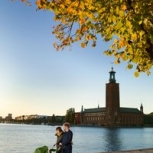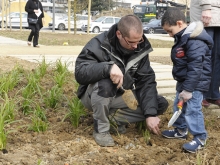
Stockholm
Stockholm is the capital city of Sweden, with over 800,000 residents in the City and 1.9 million in the metropolitan area. Besides being famous for its historic old town, world-class attractions including the Vasa ship museum, and for hosting the annual Nobel Prize ceremony, Stockholm is also world renowned for its work on clean energy and transport solutions.
The City has reduced greenhouse gas emissions per capita from 5.3 tonnes in 1990 to 3,4 tonnes in 2009 and are further aiming towards 3 tonnes by 2015 and zero emissions by 2050.
Traffic is today the major source of both green house gas emissions and health hazardous emissions. Stockholm works intensely to decrease these emissions. The public transport has increased its share and on average 64 % of the trips to Stockholm city centre is made by metro, trams, commuter trains or buses, while almost 10 % go by bike. In the morning peak hour, the share for public transport is as high as 78 %. In the inner city 68 percent is done by feet and by bike, 25 percent by public transport, whereas by car only 8 percent.
In 2006, Stockholm introduced the Congestion tax, which immediately reduced the number of trips with 20% and the emissions with 10-15 %. These figures remains the same, also when the total number of registered cars has increased by 6 % in the region
Stockholm is one of the world leading cities in introducing clean vehicles. By 2008, these vehicles amounted to 40% of the sales and almost 10 % of the total fleet, or over 90,000 vehicles are today clean. There are 170 fuelling stations offering ethanol E85 and 13 offering biogas
In 2009, there were 6,811 registered electric vehicles in Stockholm County. The vast majority of these were hybrid electric vehicles (i.e. Toyota Prius). 75 new outdoor public parking places are equipped with slow charging and 40 older indoor parking places in public garages equipped with slow charging. Also two older fast charging units established in the late 1990s are still available. The plan is to equip another 125 outdoor public parking places with slow charging during 2010.
Following the successes with bioethanol and biogas vehicles, Stockholm will initiate a market development for electrical and Plug-in hybrid-electrical vehicles, with the intermediate target to reach a market share of 10% by 2010.
SOME RELATED NETWORKS
SmartImpact
SmartImpact
The focus of this Action Planning network was less about technology solutions per se, but more about governance structures, process and business...
PREVENT
PREVENT
Involving parents in the prevention of early school leaving
Latest activities
Article
France’s ÉcoQuartier label, an initiative to support communities for sustainable city planning
The concept of “écoquartier” - the term is a contraction of the two French words “quartier” and “écologique” (ecological neighbourhood) - was...
Article
Growing cities: How to Expand in a Sustainable and Integrated way?
Population growth contributes in many cases also to increase in financial resources. Cities where population and economic growth go hand in hand can...
News
PREVENT’s raison d'être: Trust in cultural bridges for diversity
Co-operation and the fluid exchange of knowledge and experience beat at the heart of the PREVENT network, set up in 2012 by ten European cities to...
News
URBACT Infoday in Sweden
The Swedish Infoday took place in Stockholm on 17-18 November 2014. Participants were able to learn about URBACT, Network experiences and about...
News
OECD: 10th Annual Meeting of the OECD LEED Forum on Partnerships and Local Development, Stockholm, 24-25 April 2014
On behalf of the OECD LEED , it is our pleasure to invite you to the Forum on Partnerships and Local Development , which will take place in Stockholm...







